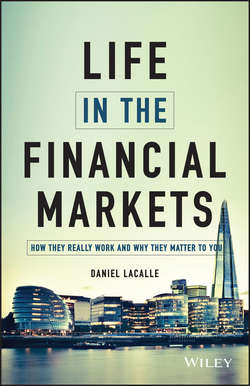Читать книгу Life in the Financial Markets - Lacalle Daniel - Страница 9
На сайте Литреса книга снята с продажи.
Part I
The financial markets: Who they are, what they are, how they work
Chapter Three
Welcome to London
ОглавлениеI left my family in Madrid and rented a tiny apartment next to the London Stock Exchange that had no central heating, and where on at least one occasion I was visited by some mice from the kitchen of the coffee shop below. Far from glamorous. But I had to save, as I had three newborns. The aim of this adventure was not to live the life of a character out of Oliver Stone's Wall Street. It was about work, work and then some more work.
I was hired as a financial analyst. I had barely any experience in the field. Of course, I had read thousands of reports and knew many analysts, but I lacked expertise, including knowledge of how to do financial modelling.
The Liverpool Street building was imposing. Huge, all glass, people streaming in and out of its doors day and night. The trading room commanded respect. Hundreds of sales executives and traders closing deals. I had seen it many times, but had never realised the power and energy it gave off. I had arrived.
I imagined there would be some kind of training, some period of adaptation, some help. Well, no. They showed me where I would work, in a row together with dozens of analysts who were talking on the phone, entering data on Excel spreadsheets and drafting reports. I was given a telephone and everything I needed, and set to work.
It was a complete culture shock. No training courses, no meetings to see how you were faring, no progress evaluation. I was with everyone and against everyone. The financial world is fiercely competitive, totally Darwinian. It's not a trade union environment; collectivist, familiar and comfortable. No one wants to waste time. It's assumed that you have been taken on for your skill, that you are able to generate the expected results and that you are sufficiently capable and self-reliant to achieve this without constant mentoring. If your work is not the best quality, someone else who has achieved better results will pick up your annual bonus.
So I took it as a personal battle. I would not fail.
I thought back to my first day at university. A teacher came into the classroom and said: “Be aware that I will fail an average of 80 % of the class.” At that moment, I knew it was me against him. I took the same approach at the beginning of my time in London. I viewed it as a personal battle and completely immersed myself in achieving my objectives, of being one of those who succeeded. Quite frankly, I had an awful time of it, and there were many occasions when I regretted being there, in that dreadful apartment with my family thousands of kilometres away, when I could have been calmly working in my permanent, comfortable, secure position in Spain.
My first major challenge was to pass the FCA (Financial Conduct Authority) exam, in order to be able to operate in the markets. It makes me furious when I read in the press that the financial markets are not well regulated and that investors and analysts are given free rein like cowboys. I would make those people all study for the exams of the CFA or the CIIA (international qualifications of financial analysts), and of course I would have them all study for – and pass – the FCA exams. Day after day, hour after hour, studying the details of one of the world's most complex and detailed set of regulations. At my age. Thirty-five. A fully fledged former Spanish company director wearing a Hermès tie and a blue suit. How ironic.
Конец ознакомительного фрагмента. Купить книгу
